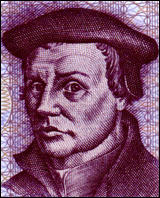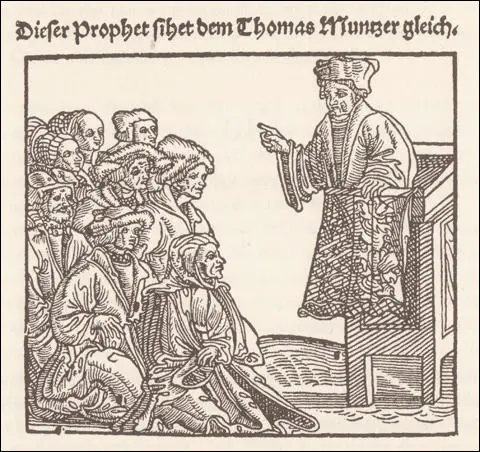Thomas Müntzer

Thomas Müntzer was born in Stolberg in about 1489. Thomas Müntzer initially studied at the University of Leipzig and later the University of Frankfurt. (2) His biographer, Eric W. Gritsch, has pointed out: "His studies led him to ordination into the priesthood. He had no difficulties attaining the regular graduate degrees, and he son became known as a learned priest committed to teaching and to critical discernment of the climate of opinion on the eve of the Reformation." (2) In 1516 Müntzer worked as a prior at Frohse monastery at Aschersleben. (3)
In 1516, Johann Tetzel, a Dominican friar arrived in Wittenberg. He was selling documents called indulgences that pardoned people for the sins they had committed. Tetzel told people that the money raised by the sale of these indulgences would be used to repair St. Peter's Basilica in Rome. A young priest named Martin Luther was very angry that Pope Leo X was raising money in this way. He believed that it was wrong for people to be able to buy forgiveness for sins they had committed. Luther wrote a letter to the Bishop of Mainz, Albert of Brandenburg, protesting the sale of indulgences. (4)
Thomas Müntzer & Martin Luther
On 31st October, 1517, Martin Luther affixed to the castle church door, which served as the "black-board" of the university, on which all notices of disputations and high academic functions were displayed, his Ninety-five Theses. The same day he sent a copy of the Theses to the professors of the University of Mainz. They immediately agreed that they were "heretical". (5) For example, Thesis 86, asks: "Why does not the pope, whose wealth today is greater than the wealth of the richest Crassus, build the basilica of St. Peter with his own money rather than with the money of poor believers?" (6)
As Hans J. Hillerbrand has pointed out: "By the end of 1518, according to most scholars, Luther had reached a new understanding of the pivotal Christian notion of salvation, or reconciliation with God. Over the centuries the church had conceived the means of salvation in a variety of ways, but common to all of them was the idea that salvation is jointly effected by humans and by God - by humans through marshalling their will to do good works and thereby to please God, and by God through his offer of forgiving grace. Luther broke dramatically with this tradition by asserting that humans can contribute nothing to their salvation: salvation is, fully and completely, a work of divine grace." (7)

Pope Leo X ordered Martin Luther to stop stirring up trouble. This attempt to keep Luther quiet had the opposite effect. Luther now started issuing statements about other issues. For example, at that time people believed that the Pope was infallible (incapable of error). However, Luther was convinced that Leo X was wrong to sell indulgences. Therefore, Luther argued, the Pope could not possibly be infallible. During the next year Martin Luther wrote a number of tracts criticising the Papal indulgences, the doctrine of Purgatory, and the corruptions of the Church. "He had launched a national movement in Germany, supported by princes and peasants alike, against the Pope, the Church of Rome, and its economic exploitation of the German people." (8)
Thomas Müntzer became a follower of Luther and in 1519 he spoke out against the Franciscan order, the Roman Catholic ecclesiastical hierarchy, and the veneration of the saints. He did not always agree with Luther and showed himself to be an independent thinker. In 1520 he moved to Beuditz Monastery at Weissenfels. "There he developed, especially under the influence of mysticism, his own view of Christianity, which became increasingly apocalyptic and spiritual. From an action-hungry conspirator in local burgher plots, he became a Reformer who began to see the work inaugurated by Luther as a fundamental change in both ecclesiastical and secular life and therefore as a revolution." (9)
| Spartacus E-Books (Price £0.99 / $1.50) | ||||||
|---|---|---|---|---|---|---|
Martin Luther had been born a peasant and he was sympathetic to their plight in Germany and attacked the oppression of the landlords. In December 1521 he warned that the peasants were close to rebellion: "Now it seems probable that there is danger of an insurrection, and that priests, monks, bishops, and the entire spiritual estate may be murdered or driven into exile, unless they seriously and thoroughly reform themselves. For the common man... is neither able nor willing to endure it longer, and would indeed have good reason to lay about him with flails and cudgels, as the peasants are threatening to do." (10)
Henry Ganss accused Luther of creating a revolutionary situation: "Luther the reformer had become Luther the revolutionary; the religious agitation had become a political rebellion... Luther had one prominent trait of character, which in the consensus of those who have made him a special study, overshadowed all others. It was an overweening confidence and unbending will, buttressed by an inflexible dogmatism. He recognized no superior, tolerated no rival, brooked no contradiction." (11)
Anabaptism
It has been claimed that Müntzer was the founder of the Anabaptist movement. (10) During this period Müntzer argued that Jesus taught that man should act in a non-violent way. They quoted him as saying: "Love your enemy and pray for those who persecute you.” (Luke 6.27) "Blessed are the peacemakers: for they shall be called sons of God." (Matthew 5.9) “Do not use force against an evil man.. But I say to you, Do not resist the one who is evil. But if anyone slaps you on the right cheek, turn to him the other also.” (Matthew 5.39) “Do not resist evil with evil.” (Luke 6.37) “He who lives by the sword will perish by the sword.” (Matthew 26.52)
Anabaptists believed that "they were the true elect of God who did not require any external authority". (13) They therefore advocated separation of church and state. Anabaptists advocated complete freedom of belief and denied that the state had a right to punish or execute anyone for religious beliefs or teachings. This was a revolutionary notion in the 16th century and every government in Europe saw them as a potential threat to both religious and political power.
Jasper Ridley has pointed out: "The Anabaptists not only objected to infant baptism, but also denied the divinity of Christ or said that he was not born to the Virgin Mary. They advocated a primitive form of Communism, denouncing private property and urging that all goods should be owned by the people in common." (14) Anabaptists believed all people were equal and kept their hats on before magistrates and superior officials and their pacifism made them reject military service. (15)
In 1523 Müntzer became a preacher in Allstedt. He married Ottilie von Gersen, a former nun, and she gave birth to two children. It was only a small town in the neighborhood of rich ore mines which produced a "restless class of miners always eager to promote social changes". Although the town only had a population of a few hundred it is claimed that his sermons were attended by as many as 2,000 people. (16)
It has been argued that where "wealthy merchants and mine owners lived cheek-by-jowl with exploited labourers and artisans it was inevitable that there would be conflict between the haves and have-nots." Müntzer was accused of exploiting the situation: "He (Müntzer) could sway crowds, play on the strings of their emotions, move them to tears of self-abnegation or roars of indignant rage." (17)
Martin Luther wrote a letter to George Spalatin, a Lutheran living in the area. He advised all Lutherans to withdraw their support of Müntzer and accused him of "abusing Scripture". Luther was concerned that his inflammatory preaching style had led to violence. (18) Eric W. Gritsch has argued that Müntzer activities "had made Luther nervous; he hated chaos and had already warned against engaging in rebellious activities." (19)
Thomas Müntzer formed the Allstedt League, a society committed to reform. During this period Robert Friedmann has claimed: "Müntzer lost altogether his sense of reality and embarked on a road of romantic fanaticism". (20) Müntzer believed that his teachings came from the Holy Spirit. This placed him in opposition to the Lutheran doctrines of justification (justification by faith alone) and of the authority of Scripture (Scripture as the exclusive source of divine truth). "The revolutionary aspect of Müntzer’s theology lay in the link he made between his concept of the inevitable conquest of the anti-Christian earthly government and the thesis that the common people themselves, as the instruments of God, would have to execute this change. He believed that the common people, because of their lack of property and their unspoiled ignorance, were God’s elect and would disclose his will." (21)
Peasants War
On 15th August 1524 Thomas Müntzer arrived in Mühlhausen. He began arguing that his reformist ideas should be applied to the economics and politics as well as religion. Müntzer began promoting a new egalitarian society. Frederick Engels wrote that Müntzer believed in "a society with no class differences, no private property and no state authority independent of, and foreign to, members of society". (22)
Müntzer began calling for rebellion. In one speech he told the peasants: "The worst of all the ills on Earth is that no-one wants to concern themselves with the poor. The rich do as they wish... Our lords and princes encourage theft and robbery. The fish in the water, the birds in the sky, and the vegetation on the land all have to be theirs... They... preach to the poor: 'God has commanded that thou shalt not steal'. Thus, when the poor man takes even the slightest thing he has to hang." (23)
Martin Luther seemed to take the side of the peasants and in May 1525 he published An Admonition to Peace: A Reply to the Twelve Articles of the Peasants in Swabia: "To the Princes and Lords... We have no one on earth to thank for this mischievous rebellion, except you princes and lords; and especially you blind bishops and mad priests and monks... since you are the cause of this wrath of God, it will undoubtedly come upon you, if you do not mend your ways in time. ... The peasants are mustering, and this must result in the ruin, destruction, and desolation of Germany by cruel murder and bloodshed, unless God shall be moved by our repentance to prevent it... If these peasants do not do it for you, others will... It is not the peasants, dear lords, who are resisting you; it is God Himself. ... To make your sin still greater, and ensure your merciless destruction, some of you are beginning to blame this affair on the Gospel and say it is the fruit of my teaching... You did not want to know what I taught, and what the Gospel is; now there is one at the door who will soon teach you, unless you amend your ways." (24)
In March 1525, Müntzer succeeded in taking over the Mühlhausen town council and setting up a type of communistic society. By the spring of 1525 the rebellion, known as the Peasants’ War, had spread to much of central Germany. The peasants published their grievances in a manifesto titled The Twelve Articles of the Peasants; the document is notable for its declaration that the rightness of the peasants’ demands should be judged by the Word of God, a notion derived directly from Luther’s teaching that the Bible is the sole guide in matters of morality and belief. (25)
Although it is true that Martin Luther he agreed with many of the peasants' demands, he hated armed strife. He travelled round the country districts, risking his life to preach against violence. Martin Luther also published the tract, Against the Murdering Thieving Hordes of Peasants, where he urged the princes to "brandish their swords, to free, save, help, and pity the poor people forced to join the peasants - but the wicked, stab, smite, and slay all you can." Some of the peasant leaders reacted to the tract by describing Luther as a spokesman for the oppressors. (26)
In the tract Luther made it clear that he now had no sympathy for the rebellious peasants: "The pretences which they made in their twelve articles, under the name of the Gospel, were nothing but lies. It is the devil's work that they are at.... They have abundantly merited death in body and soul. In the first place they have sworn to be true and faithful, submissive and obedient, to their rulers, as Christ commands... Because they are breaking this obedience, and are setting themselves against the higher powers, willfully and with violence, they have forfeited body and soul, as faithless, perjured, lying, disobedient knaves and scoundrels are wont to do."
Luther called on the nobility of Germany to destroy the rebels: "They (the peasants) are starting a rebellion, and violently robbing and plundering monasteries and castles which are not theirs, by which they have a second time deserved death in body and soul, if only as highwaymen and murderers ... if a man is an open rebel every man is his judge and executioner, just as when a fire starts, the first to put it out is the best man. For rebellion is not simple murder, but is like a great fire, which attacks and lays waste a whole land. Thus rebellion brings with it a land full of murder and bloodshed, makes widows and orphans, and turns everything upside down, like the greatest disaster." (27)
Derek Wilson, the author of Out of the Storm: The Life and Legacy of Martin Luther (2007), pointed out the Luther strongly defended the inequality that existed in 16th century Germany. "Luther told the peasants... the rebels have no mandate from God to challenge their masters and, as Jesus had shown by his rebuking of Peter who had drawn the sword in the Garden of Gethsemane, violence was never an option for the Christian. Vengeance and the rightings of wrongs belonged to God... Luther went through their twelve demands. The abolition of serfdom was fanciful nonsense; equality under the Gospel does not translate into the removal of social grading. Without class distinctions society would disintegrate into anarchy. By the same token, the withholding of tithes would be an unwarranted attack on the economic working of the prevailing system." (28)
Thomas Müntzer led about 8,000 peasants into battle in Frankenhausen on 15th May 1525. Müntzer told the peasants: "Forward, forward, while the iron is hot. Let your swords be ever warm with blood!" Armed with mostly scythes and flails they stood little chance against the well-armed soldiers of Philip I of Hesse and Duke George of Saxony. The combined infantry, cavalry and artillery attack resulted in the peasants fleeing in panic. Over 3,000 peasants were killed whereas only four of the soldiers lost their lives. (29)
Müntzer was captured on 25th May. Anticipating his execution, Müntzer dictated a letter on 17th May to friends in Mühlhausen from his prison in Heldrungen. He asked them to take care of his wife and to dispose of his possessions, consisting mostly of books and clothes. (30)
Thomas Müntzer was tortured and finally executed on 27th May, 1525. His head and body were displayed as a warning to all those who might again preach treasonous doctrines. (31) Other ringleaders were also executed. "Meanwhile, all over Germany, the mopping-up operation got under way as the princes exacted their revenge and reasserted their authority. Men who had taken up arms or simply against their masters or who fell foul of informers were imprisoned or beheaded... To any unbiased commentator, then or twice, the reaction has seemed to be out of all proportion to the offence." (32)
Primary Sources
(1) Eric W. Gritsch, Thomas Müntzer: A Tragedy of Errors (2010)
His (Thomas Müntzer) studies led him to ordination into the priesthood. He had no difficulties attaining the regular graduate degrees, and he son became known as a learned priest committed to teaching and to critical discernment of the climate of opinion on the eve of the Reformation.
His contacts in Braunschweig, located a short distance north of Stolberg, provided the young priest with an income and involved him in altercations about the significance of indulgences, which was the subject of critical debate between churchmen and theologians and which concerned political leaders who sought ecclesiastical reform.
(2) Robert Friedmann, Global Anabaptist Mennonite Encyclopedia Online (1987)
Thomas Müntzer was perhaps the most controversial figure of the period of the German Reformation, a man who has been called at various times the "beginner of the great Anabaptist movement," the forerunner of modern socialism, the beginner of the mystical-spiritualistic movement in Germany, a religious socialist, the leader in the Peasants' War 1525, and other such designations, none of which really fit this versatile man who during the decisive last five years of his life (1520-1525) changed his position almost from year to year. Karl Holl's assertion that most of the catchwords or slogans of the German Reformation during its formative period were made current by this fiery and restless mind is acceptable. Noble and deep thoughts mingle in his writings with rather coarse and rude expressions, not to say offensive passages; genuine spirituality alternates with fanciful inspirationism. At the end, in spite of his position as a priest and preacher, one may legitimately ask: Was he still a Christian?
The literature about Müntzer is extensive but not too enlightening, providing for each author an occasion for personal interpretation of an ambiguous personality, thereby using categories often wanting in precision. Praise and blame, love and hatred speak from these writings, but no author seems to be able to be fully neutral and detached. But since Müntzer has quite persistently been called the "originator of the great Anabaptist movement" it is desirable that a careful and objective study be made of his relation to Anabaptism.
(3) Ernest Belfort Bax, The Peasants War in Germany (1987)
Thomas Münzer appears to have been born in the last decade of the fifteenth century. An uncertain tradition states that his father was hanged by the Count of Stolberg. The first we hear of him with certainty is as teacher in the Latin school at Aschersleben and afterwards at Halle. Where he studied is doubtful, but by this time he had already graduated as doctor. In Halle he is alleged to have started an abortive conspiracy against the Archbishop of Magdeburg. In 1515 we find him as confessor in a nunnery and afterwards as teacher in a foundation school at Brunswick. Finally, in 1520, he became preacher at the Marienkirche at Zwickau, and here his public activity in the wider sense really began. The democratic tendencies previously displayed by him broke all bounds. He thundered against those who devoured widows’ houses and made long prayers and who at death-beds were concerned not with the faith of the dying but with the gratification of their measureless greed.
At this time Münzer was still a follower of Luther, but it was not long before he found him a lukewarm church-reformer. Luther’s bibliolatry, as opposed to his own belief in the continuous inspiration of certain chosen men by the Divine spirit, excited his opposition. He criticised still more severely as an unpardonable inconsistency Luther’s retention of certain dogmas of the old Church whilst rejecting others. He now began to study with enthusiasm the works of the old German mystics, Meister Eck and Johannes Tauler, and more than all those of Joachim Floras, the Italian enthusiast of the twelfth century. A general conviction soon came uppermost in his mind of the necessity of a thorough revolution alike of Church and State.
His mystical tendencies were strengthened by contact with a sect which had recently sprung up amongst the clothworkers of Zwickau, and of which one Nicholas Storch, a master clothworker, was corypheus. The sect in question lived in a constant belief in the approach of a millennium to be brought about by the efforts of the “elect”. Visions and ecstasies were the order of the day amongst these good people. This remarkable sect influenced various prominent persons at this time. Karlstadt was completely fascinated by them. Melancthon was carried away; and even Luther admits having had some doubts whether they had not a Divine mission. The worthy Elector Friedrich himself would take no measures against them, in spite of the dangerous nature of their teaching from the point of view of political stability. He was afraid, as he said “lest perchance he should be found fighting against God”.
It was not long before Münzer allied himself with these “enthusiasts,” or “prophets of Zwickau,” as they were called. When the patrician council at Zwickau forbade the cloth-workers to preach, Münzer denounced the ordinance and encouraged them to disobey it. New prohibitions followed, culminating in prosecutions and imprisonments. The result was that, by the end of 1521, the cloth-working town had become too hot to hold the new reformers. Some fled to Wittenberg, and others, including Münzer himself, into Bohemia. Arrived in Prague, Münzer posted up an announcement in Latin and German that he would “like that excellent warrior of Christ, Johann Huns, fill the trumpets with a new song”. He proceeded in his addresses to denounce the clergy, and to prophesy the approaching vengeance of heaven upon their order. He here also preached against the “dead letter,” as he called it, of the Bible, expounding his favourite theory of the necessity of believing in the supplemental inspiration of all elect persons. But the soil of Bohemia proved not a grateful one. It had been exhausted by over a century of religious fanaticism and utopistic dreams of social regeneration.
Student Activities
Martin Luther and Thomas Müntzer (Answer Commentary)
Martin Luther and the Reformation (Answer Commentary)
Henry VIII (Answer Commentary)
Henry VII: A Wise or Wicked Ruler? (Answer Commentary)
Henry VIII: Catherine of Aragon or Anne Boleyn?
Was Henry VIII's son, Henry FitzRoy, murdered?
Hans Holbein and Henry VIII (Answer Commentary)
The Marriage of Prince Arthur and Catherine of Aragon (Answer Commentary)
Henry VIII and Anne of Cleves (Answer Commentary)
Was Queen Catherine Howard guilty of treason? (Answer Commentary)
Anne Boleyn - Religious Reformer (Answer Commentary)
Did Anne Boleyn have six fingers on her right hand? A Study in Catholic Propaganda (Answer Commentary)
Why were women hostile to Henry VIII's marriage to Anne Boleyn? (Answer Commentary)
Catherine Parr and Women's Rights (Answer Commentary)
Women, Politics and Henry VIII (Answer Commentary)
Historians and Novelists on Thomas Cromwell (Answer Commentary)
Martin Luther and Hitler's Anti-Semitism (Answer Commentary)
Mary Tudor and Heretics (Answer Commentary)
Joan Bocher - Anabaptist (Answer Commentary)
Anne Askew – Burnt at the Stake (Answer Commentary)
Elizabeth Barton and Henry VIII (Answer Commentary)
Execution of Margaret Cheyney (Answer Commentary)
Robert Aske (Answer Commentary)
Dissolution of the Monasteries (Answer Commentary)
Pilgrimage of Grace (Answer Commentary)
Poverty in Tudor England (Answer Commentary)
Why did Queen Elizabeth not get married? (Answer Commentary)
Francis Walsingham - Codes & Codebreaking (Answer Commentary)
Sir Thomas More: Saint or Sinner? (Answer Commentary)
Hans Holbein's Art and Religious Propaganda (Answer Commentary)
1517 May Day Riots: How do historians know what happened? (Answer Commentary)




